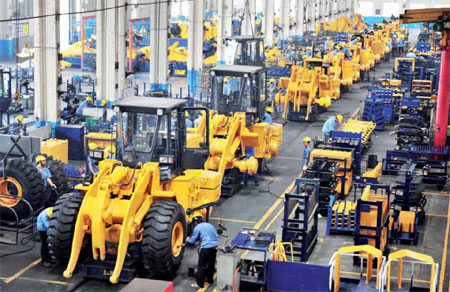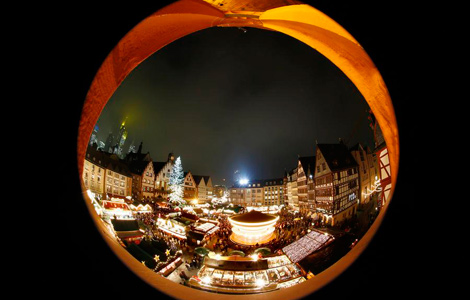No longer poles apart
Updated: 2013-11-29 10:29
By Du Juan (China Daily Europe)
|
|||||||||||
|
Guangxi Liugong Machinery Co Ltd's assembly line in Liuzhou, the Guangxi Zhuang autonomous region. The company's acquisitions in Stalowa Wola, in Poland, are expanding its capabilities into the European market. Wang Zhongbin / Xinhua |
A Chinese machinery giant's efforts in Poland are paying off despite challenges
In Stalowa Wola, a town with a population of about 65,000 in southeastern Poland, a Chinese company made its presence known with a takeover of a traditional local machinery company that connected two different cultures and markets.
"Many entrepreneurs still hold a superficial understanding of 'internationalization' on the trading stage. However, trading is like floating duckweed on water without roots while marketing is different," says Zeng Guang'an, Liugong's vice-chairman and president.
"Marketing is like planting trees. After you plant a young tree in a local market, you need to take care of it until it grows bigger.
'One tree is not enough. We want to raise a forest," he says.
Leading the whole process of Liugong's takeover of Huta Stalowa Wola Construction Equipment Division and its distribution subsidiary Dressta Co in Stalowa Wola, Zeng completed his planting of the first tree in Europe.
The process took more than two years of negotiations. Liugong acquired the Construction Equipment Division of HSW and Dressta in February 2012, a time when many European companies were suffering from a weak economy.
The acquisition became Liugong's first outright purchase of manufacturing facilities and distribution outside its domestic market.
Many Chinese companies have gone global in recent years but success has not been easy.
Chinese engineers and management officials from Guangxi Liugong Machinery Co Ltd, one of the leading construction equipment manufacturing companies in China, spent three to four hours by car to reach this small town, which is located about 240 kilometers south of the country's capital Warsaw, following a more than nine-hour flight from China.
However, the takeover has brought mutual benefits to Liugong and HSW.
As part of the deal Liugong will acquire the first-class crawler dozers (a specialist bulldozer) production line owned by HSW, Zeng says. Established in 1937, HSW is well-known for its manufacturing of high-quality crawler dozers at its plant in Podkarpackie province.
"The research and development investment for crawler dozer production lines is huge and difficult," Zeng says.
"Only five companies in the world can really make high-quality crawler dozers. The technology Liugong can gain from the takeover is really attractive."
Second, the takeover of Dressta can help Liugong expand its European market, which currently is not a major overseas market for certain Chinese companies.
In addition, Poland has almost the lowest manufacturing and labor costs in Europe. The payment of employees at Liugong Machinery (Poland) Co Ltd equals about one-sixth of that of Germans in the same line of work and only 1.5 times Liugong's Chinese employees.
In return, Liugong also helps the Polish company in many sectors, including reducing costs, improving production efficiency and expanding its sales markets.
"Liugong has a well-established global distribution network that Dressta can make use of to increase its overseas sales," says Lestaw Holysz, chief executive officer of Dressta.
"We need more dealers and Liugong has them," he says.
Since Liugong started its "go overseas" strategy in 2002, it has built up a distribution network with more than 400 dealers in 130 countries and regions globally and two overseas manufacturing plants outside China.
Unlike many other Chinese companies, Liugong tried hard to infuse its concepts, culture and management into its overseas plants in addition to making money.
"We want to send a message to the Polish government and local residents that we are not only buying their technology through the takeover. We are also bringing our best technology and products here," Zeng says. "Plus, we will definitely continue our investment and Poland will become Liugong's manufacturing center in Europe."
Even though Liugong has experienced a smooth integration after the takeover, it has also met many obstacles.
The number of employees at Liugong Poland accounts for 12 percent of Liugong's total figure while they only contribute 3 percent of Liugong's overall revenues, according to Wu Yindeng, executive vice-president of Liugong Machinery (Poland) Co.
The reasons are many.
The European market for Liugong is not as big as the Chinese one and production efficiency at the Polish plant is much lower than it is in China.
Li Mingsheng, production manager of Liugong Poland, says the company has sent many Chinese engineers to Poland to work with local counterparts in order to raise efficiency.
"In Liugong's plants in China, every seven minutes there is one machine completed from the production line. However, only five to six machines can be completed in one day at its Polish plant," Li says.
In 2012, Liugong Poland sold about 400 machines, but had sold only about 200 machines by October this year, according to Li.
Zeng says the whole industry is facing a tough time because of the gloomy economy.
"The challenge is to bring the two cultures together," says David Beatenbough, vice-president of Liugong Machinery.
"From the production side, Poland is very different from what we do in other parts of the world," he says.
"From the R&D side, Chinese engineers are young and passionate with less experience, while the Polish engineers are very experienced and logical, but hard to change in terms of their working methods," Beatenbough says.
At present, the company has 12 R&D teams in Poland with one Chinese and one Polish engineer in each, aiming at bringing the two cultures together in a smooth way, according to Beatenbough.
Facing the challenges ahead, Liugong will continue to expand its investments. Beatenbough says Liugong has an ambitious plan for its global marketing.
In addition to existing overseas markets including South Africa, the Middle East and Russian-speaking areas, it will expand its North American market, which accounts for only about 1 percent of Liugong's total sales volume at present.
"We have been investing in long-term and careful bases," he says.
Liugong has also been working hard to improve its products' quality and technology to adapt to the new market.
"First of all, we need to increase our distribution intensity," Beatenbough says.
In 2012, the overseas revenue of Liugong amounted to 3.66 billion yuan ($600 million; 443 million euros), up 28.43 percent year-on-year, accounting for about 30 percent of Liugong's total revenues.
According to Liugong's half-year report in August, it achieved 6.6 billion yuan in revenue in the first half, a year-on-year decline of 10 percent. The net profit was 261 million yuan, a 16 percent drop year-on-year.
The company said the profit performance was better than expected.
China's machinery industry has been gloomy from the beginning of the year.
About 12,000 machinery producers - 16 percent of all companies in the sector - recorded losses in the first half. That was still an improvement from the start of the year, when 22 percent of companies in the industry were losing money, according to the China Machinery Industry Federation.
It is good for Chinese companies to go overseas and expand their businesses, but it is more important for those companies to realize real growth after takeovers, says Cai Weici, vice-president of the federation.
"Chinese companies are working on upgrading their technology and production in order to gain back market share, which had been dependent on imports," he says.
dujuan@chinadaily.com.cn
Today's Top News
'Europe season' visits aim for mutual benefit
British to cultivate closer trade links
Air zone 'not aimed at civilian flights'
Industrial sector's profits rise in Oct
Holiday plans stir up complaints
Chinese premier carries hectic schedule
EU, China set timetable for talks
FTA to work on its negative list
Hot Topics
Lunar probe , China growth forecasts, Emission rules get tougher, China seen through 'colored lens', International board,
Editor's Picks

|

|

|

|

|

|






